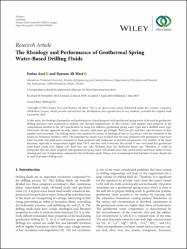| dc.contributor.author | Avcı, Emine | |
| dc.contributor.author | Mert, Bayram Ali | |
| dc.date.accessioned | 2020-05-24T15:32:17Z | |
| dc.date.available | 2020-05-24T15:32:17Z | |
| dc.date.issued | 2019 | |
| dc.identifier.citation | Avci, E., Mert, B.A. (2019). The Rheology and Performance of Geothermal Spring Water-Based Drilling Fluids. Geofluids, Article ID 3786293, 8 pages.
https://doi.org/10.1155/2019/3786293 | en_US |
| dc.identifier.issn | 1468-8115 | |
| dc.identifier.issn | 1468-8123 | |
| dc.identifier.uri | https://doi.org/10.1155/2019/3786293 | |
| dc.identifier.uri | https://hdl.handle.net/20.500.12508/1252 | |
| dc.description | WOS: 000473400900001 | en_US |
| dc.description.abstract | In this study, the rheological properties and performances of mud prepared with geothermal spring water to be used by geothermal drilling operators were examined at ambient and elevated temperatures. In this context, mud samples were prepared in the compositions detailed in the API specification by using five different geothermal spring water types and a distilled water type. Afterwards, density, apparent viscosity, plastic viscosity, yield point, gel strength, fluid loss, pH, and filter cake thickness of these samples were measured. The drilling muds were analyzed by means of rheological tests in accordance with the standards of the American Petroleum Institute (API). The experimental results have revealed that the mud prepared with geothermal water have lower viscosity and yield point compared to those prepared with freshwater at elevated temperatures. The stability of the muds decreases, especially at temperatures higher than 250 degrees F, and they start to become flocculated. It was concluded that geothermal water-based muds have higher API fluid loss and cake thickness than the freshwater-based one. Therefore, it could be interpreted that the muds prepared with geothermal spring water will exhibit lower flow performance and lower ability of hole cleaning and rate of penetration compared to the freshwater muds. Hence, it is recommended that this kind of water should not be used to prepare drilling mud. | en_US |
| dc.language.iso | eng | en_US |
| dc.publisher | Wiley-Hindawi | en_US |
| dc.relation.isversionof | 10.1155/2019/3786293 | en_US |
| dc.rights | info:eu-repo/semantics/openAccess | en_US |
| dc.subject.classification | Geochemistry & Geophysics | en_US |
| dc.subject.classification | Geology | en_US |
| dc.subject.classification | Drilling fluids | Oil field equipment | Wellbore instability | en_US |
| dc.subject.other | Filtration properties | en_US |
| dc.subject.other | Ionic liquid | en_US |
| dc.subject.other | Well | en_US |
| dc.subject.other | Suspensions | en_US |
| dc.subject.other | Model | en_US |
| dc.subject.other | Deep | en_US |
| dc.subject.other | Mud | en_US |
| dc.subject.other | Drilling fluid | en_US |
| dc.subject.other | Experimental study | en_US |
| dc.subject.other | Geothermal system | en_US |
| dc.subject.other | Hydrocarbon reservoir | en_US |
| dc.subject.other | Performance assessment | en_US |
| dc.subject.other | Rheology | en_US |
| dc.subject.other | Spring water | en_US |
| dc.subject.other | Viscosity | en_US |
| dc.title | The Rheology and Performance of Geothermal Spring Water-Based Drilling Fluids | en_US |
| dc.type | article | en_US |
| dc.relation.journal | Geofluids | en_US |
| dc.contributor.department | Mühendislik ve Doğa Bilimleri Fakültesi -- Petrol ve Doğalgaz Mühendisliği Bölümü | en_US |
| dc.contributor.authorID | 0000-0002-1782-3543 | en_US |
| dc.contributor.authorID | 0000-0002-3492-9817 | en_US |
| dc.relation.publicationcategory | Makale - Uluslararası Hakemli Dergi - Kurum Öğretim Elemanı | en_US |
| dc.contributor.isteauthor | Avcı, Emine | en_US |
| dc.contributor.isteauthor | Mert, Bayram Ali | en_US |
| dc.relation.index | Web of Science Core Collection - Science Citation Index Expanded | en_US |
| dc.relation.index | Web of Science - Scopus | en_US |
















